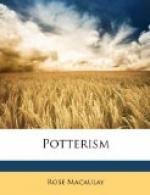‘Nothing of any importance, dear,’ I told her.
She looked at me in the rather strange, troubled, frowning way she has now sometimes.
‘Oh, do let’s go home, mother,’ she said suddenly. ’I’m so tired. And I don’t believe they’re really starving a bit, and I don’t care if they are. I do hate bazaars.’
Clare used once to be quite fond of them. But she seemed to hate so many things now, poor child.
I took her home, and that evening I told Percy about my interview with Mr. Juke.
‘A libel action,’ said Percy, ’would be excellent. The very thing. But if he’s guilty, he won’t bring one.’
‘Anyhow,’ I said, ’I feel it is our duty not to let the affair drop. We owe it to poor dear Oliver. Even now he may be looking down on us, unable to rest in perfect peace till he is avenged.’
‘He may, he may, my dear,’ said Percy, nodding his head. ’Never know, do you. Never know anything at all.... On the other hand, he may have lost his own balance, as they decided at the inquest, and tumbled downstairs on to his head. Nasty stairs; very nasty stairs. Anyhow, if Gideon didn’t shove him, he’s nothing to be afraid of in our talk, and if he did he’ll have to face the music. Troublesome fellow, anyhow. That paper of his gets worse every week. It ought to be muzzled.’
I couldn’t help wondering how it would affect the Weekly Fact if its editor were to be arrested on a charge of wilful murder.
PART IV:
TOLD BY KATHERINE VARICK
A BRANCH OF STUDY
1
People are very odd, unreliable, and irregular in their actions and reactions. You can’t count on them as you can on chemicals. I suppose that merely means that one doesn’t know them so well. They are far harder to know; there is a queer element of muddle about them that baffles one. You never know when greediness—the main element in most of us—will stop working, checked by something else, some finer, quite different motive force. And them checking that again, comes strong emotion, such as love or hate, overthrowing everything and making chaos. Of course, you may say these interacting forces are all elements that should be known and reckoned with beforehand, and it is quite true. That is just the trouble: one doesn’t know enough.
Though I don’t study human nature with the absorption of Laurence Juke (after all, it’s his trade), I find it interesting, like other curious branches of study. And the more complex and unreliable it is, so much the more interesting. I’m much more interested, for instance, in Arthur Gideon, who is surprising and incalculable, than in Jane and Johnny Potter, who are pushed along almost entirely by one motive—greed. I’m even less interested in Jane and Johnny than in the rest of their family, who are the usual British mixture of humbug, sentimentality, commercialism, and genuine feeling. They represent Potterism, and Potterism is a wonderful thing. The twins are far too clear-headed to be Potterites in that sense. You really can, on almost any occasion, say how they will act. So they are rather dull, as a study, though amusing enough as companions.




